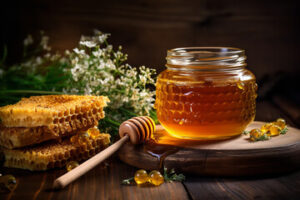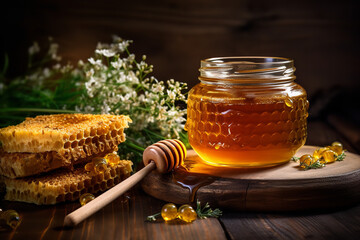Wildflower Honey is a rich source of vitamins and minerals, particularly vitamin B. It also contains antioxidants that can help reduce inflammation in the body, prevent heart conditions, and ward off certain types of cancer.
The benefits of local raw wildflower honey also include easing symptoms in people with seasonal allergies.
Wildflower Honey is a natural sweetener that’s loaded with antioxidants. It’s made from the nectar of a wide range of flowers, including clover, dandelions, linden blossoms and thistle, infusing it with a rich and robust taste that differs depending on the floral mix of each harvest. It’s often multi-dimensional with notes of floral, fruity or herbal flavor, making it a fun honey to explore and enjoy.
Since wildflower honey is unpasteurized, it carries the essence of the local flora where it was harvested. It can have a variety of flavors and aromas due to the different flowers that the bees visited. It can also vary by season, as the available blooms will change from one time of year to another.
Like most natural sweeteners, wildflower honey is a low-glycemic food. It can help regulate blood sugar levels better than refined sugar and has a lower glycemic index than most fruits. However, it is still a sugar and should be consumed in moderation.
It’s also a great natural alternative to white sugar in recipes and coffee. It can be drizzled over a bowl of oatmeal or used as a replacement in baked goods to add moisture and sweetness. It’s also a great addition to salad dressings and marinades. The flavor of the honey can enhance savory dishes and elevate cheese assortments or charcuterie platters.
The antibacterial properties of raw honey can help with digestion and soothe a sore throat. It can also be applied to wounds to help heal and prevent infection. Honey has a history of use as a beauty remedy for dry, chapped lips, eye circles and more. It’s a popular facial mask ingredient because it can soften the skin, promote hydration and reduce puffiness.
The nutrients in honey are important for overall health and wellness. It provides a natural energy source by providing the body with a steady stream of glucose, fructose and dextrose. It is also a good source of vitamins, minerals and enzymes. It also contains many antioxidants, which can fight oxidative damage to cells, tissues and organs.
It’s Rich in Vitamins
If you’re a fan of honey, you know that this natural sweetener is packed with vitamins. But did you know that raw wildflower honey is particularly rich in a wide range of vitamins and minerals? Wildflower honey is derived from the nectar of multiple types of flowers and plants, including clover, dandelions, thistle, and lavender. As a result, it can have a flavor profile that’s slightly different from season to season.
The variety of plant sources that produce the nectar used to make wildflower honey also gives this type of honey a more varied nutritional profile than other kinds of honey. It contains the easily digestible simple sugars fructose and glucose, along with water, pollen, enzymes, organic acids and proteins. These nutrients help to strengthen the immune system and protect the body from disease.
It’s also a good source of antioxidants, which are known to fight oxidative stress and promote cell health. It also contains a number of B vitamins, including vitamin C, folate, vitamin A and vitamin D. Additionally, this type of honey is rich in minerals, such as calcium, magnesium, iron and zinc.
Wildflower honey is a great addition to your diet. It pairs well with tea, coffee, bread, toast and other foods that can benefit from a little sweetness. It also helps to mellow out the sharpness of acidic salad dressings, or it can be employed as a saccharine counterpoint to savory dishes like cheese assortments and charcuterie platters.
It’s important to choose a quality brand of honey that’s not overly processed or pasteurized. Raw honey retains more of its natural nutrients and is more beneficial for the body. This is because it has not undergone the high heats that are involved in most commercially produced honey. It also has more of the original amount of bee pollen and propolis, which have been shown to be effective at treating a number of ailments and conditions.
It’s Rich in Minerals
While the honey you find in the grocery store may be made from a variety of sugars and artificial ingredients, raw wildflower honey contains a wealth of nutrients that are incredibly beneficial to your health. This includes the easily digestible simple sugars glucose and fructose, as well as vitamins, minerals, enzymes, and antibacterial properties. When purchasing wildflower honey, look for a product that is unpasteurized and certified organic. This type of honey will contain more of the beneficial compounds that are often stripped away by high heat during processing.
Wildflower Honey is made from the nectar of a wide variety of flowers, which can include clover, dandelions, sunflowers, lavender, and thistle. As such, it can vary in color and taste from season to season, reflecting the local flora where the honey bees gather their nectar. It is also known for its robust flavor and aroma, which may be more floral or fruity depending on the blend of flowers from which it was harvested.
Another notable feature of this honey is its rich mineral content, which is particularly abundant in calcium, magnesium, and potassium. These minerals are crucial to our health, as they support bone strength and function, nerve activity, immune system response, and energy production.
Lastly, our organic wildflower honey is a wonderful natural preservative, as it naturally fights bacteria and yeasts in the food that it helps to keep fresh. Its antimicrobial properties are a great benefit to those who have sensitive stomachs or suffer from digestive issues, such as acid reflux.
Moreover, this variety of honey is also a natural remedy for sore throats and coughs. Its antibacterial and anti-inflammatory properties help to soothe irritation, reduce inflammation, and combat bacteria that may be causing the cough or sore throat. This makes it a great alternative to conventional over-the-counter syrups. It can also be used as a topical treatment for minor burns, wounds, and scrapes, as it effectively promotes healing. Simply apply the honey to the affected area to soothe pain and itching, as well as encourage healing. The vitamin C found in the honey also acts as an antioxidant, helping to protect cells and prevent premature aging.
It’s Rich in Flavor
Wildflower honey is made from the nectar of a number of different flowers and blossoms. The variety of flowers results in a more delectable, rich flavor than clover honey. This makes it ideal for sweetening tea or toast and adding depth to marinades, sauces, and baked goods.
It’s also a popular choice among people with sensitive tastes. Wildflower honey may have hints of citrus or vanilla in its flavor profile, and it can also vary in color from light amber to deep brown, depending on the flowers from which it was foraged.
The floral and savory flavor notes of this type of honey make it well-suited for a range of culinary applications. It adds richness and complexity to salad dressings, marinades, and roasted vegetable recipes. It can also mellow the sharpness of acidic fruits and vegetables or intensify the flavors of cheese assortments and charcuterie platters.
The nutritional elements of both wildflower and clover honey are similar, serving as natural energy sources, replete with vitamins, minerals, and enzymes. However, it’s important to prioritize raw varieties over processed ones, as the latter undergoes extensive heating and ultra-filtration. This process strips away many of the honey’s naturally occurring nutrients.
Use a spoon to drizzle wildflower honey over buttered toast or scones. Alternatively, try combining it with fresh herbs for a deliciously fragrant salad dressing. You can experiment with the type of herbs you choose, from pansies to chrysanthemums, or even rosemary and lavender. Keep in mind, though, that some edible flowers are allergy triggers and be sure not to include any that you or anyone else in your home is allergic to.
